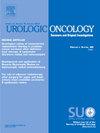RACIAL DIFFERENCES IN SURVIVAL FOR LOCALLY ADVANCED RENAL CELL CARCINOMA
IF 2.4
3区 医学
Q3 ONCOLOGY
Urologic Oncology-seminars and Original Investigations
Pub Date : 2025-03-01
DOI:10.1016/j.urolonc.2024.12.054
引用次数: 0
Abstract
Introduction
Previous studies have established African Americans with renal cell carcinoma (RCC) have aggressive tumors and worse outcomes compared to other races. The impact of racial differences on locally advanced tumors (specifically tumor thrombus) and metastatic RCC (mRCC) remains unclear. We aim to evaluate survival outcomes among different racial groups in a population of RCC tumor thrombus patients.
Methods
This retrospective study, approved by the IRB with a consent waiver, analyzed patients aged 40-80 with primary (RCC) and tumor thrombus who underwent nephrectomy between 2010 and 2015 using the National Cancer Database (NCDB). The study focused on patients with RCC and tumor thrombus to assess survival differences between racial backgrounds. Demographic covariates included age, sex, and race and ethnicity (non-Hispanic White, non-Hispanic African American, Hispanic, or none of the above). Clinical covariates included stage, grade, subtype, tumor thrombus level, type of surgery, comorbidities, hospital type, and patient residence.
The data were analyzed with statistical tests including Kruskal-Wallis, Chi-square, and log-rank tests to compare results by race/ethnicity. Survival outcomes were assessed with Kaplan-Meier curves, and multivariable analyses employed Cox proportional hazards regression and multinomial logistic regression. All analyses were conducted using Stata/SE 18.0, with significance set at P<0.05.
Results
We identified 11,520 patients, aged 40-80, with the diagnosis of renal cell carcinoma (RCC) and tumor thrombus who underwent surgery from 2010-2015. Among them, 83% were non-Hispanic White, 6% non-Hispanic African American, 7% Hispanic, and 3% other races.
Mortality rates were 55% overall and 82% in metastatic RCC (mRCC) cases. The study population included 2,429 mRCC patients. Survival analysis showed African Americans had lower survival compared to Caucasians in both the overall and mRCC cohorts. Multivariable analysis confirmed higher mortality for African Americans ( HR: 1.22 overall with P<0.001; 1.24 in mRCC with p=0.019).
Overall, 5-year survival rates according to the presence of tumor thrombus did not differ among higher levels between Caucasians and African Americans for level I-III 39% and 46%, p=0.21; and Level IV 39% and 39%, p=0.39, respectively. There was a survival advantage for Level 0 tumor thrombus among the Caucasian population, p<0.001 Log-rank test.
Conclusions
African American patients diagnosed with RCC and tumor thrombus face a 22% higher risk hazard of mortality compared to non-Hispanic white patients. They often present with more locally advanced and mRCC. The mortality risk hazard for metastatic RCC is increased by 24% compared to Caucasians. The results underscore the demographic impact of race on disease severity and support clinical consideration when managing African American patients.
局部晚期肾细胞癌生存的种族差异
先前的研究已经证实非裔美国人患有肾细胞癌(RCC)的肿瘤具有侵袭性,与其他种族相比预后更差。种族差异对局部晚期肿瘤(特别是肿瘤血栓)和转移性RCC (mRCC)的影响尚不清楚。我们的目的是评估不同种族的RCC肿瘤血栓患者的生存结果。方法本回顾性研究经IRB批准,使用国家癌症数据库(NCDB)分析了2010年至2015年间接受肾切除术的40-80岁原发性(RCC)和肿瘤血栓患者。该研究的重点是RCC和肿瘤血栓患者,以评估种族背景之间的生存差异。人口统计学协变量包括年龄、性别、种族和民族(非西班牙裔白人、非西班牙裔美国人、西班牙裔或以上皆非)。临床协变量包括分期、分级、亚型、肿瘤血栓水平、手术类型、合并症、医院类型和患者居住地。对数据进行统计检验,包括Kruskal-Wallis、卡方检验和log-rank检验,以比较不同种族/民族的结果。生存结果采用Kaplan-Meier曲线评估,多变量分析采用Cox比例风险回归和多项逻辑回归。所有分析均采用Stata/SE 18.0进行,显著性设置为P<;0.05。结果本研究纳入了2010-2015年间11,520例诊断为肾细胞癌(RCC)和肿瘤血栓的患者,年龄在40-80岁之间。其中83%为非西班牙裔白人,6%为非西班牙裔非裔美国人,7%为西班牙裔,3%为其他种族。总体死亡率为55%,转移性RCC (mRCC)病例死亡率为82%。研究人群包括2429例mRCC患者。生存分析显示,在总体和mRCC队列中,非裔美国人的生存率都低于白种人。多变量分析证实非裔美国人的死亡率更高(总体风险比:1.22,P<0.001;mRCC为1.24,p=0.019)。总体而言,根据肿瘤血栓的存在,白种人和非裔美国人的5年生存率在较高水平的I-III级之间没有差异,分别为39%和46%,p=0.21;IV级分别为39%和39%,p=0.39。白种人中0级肿瘤血栓存在生存优势,p < 0.001 Log-rank检验。结论与非西班牙裔白人患者相比,非洲裔美国人诊断为RCC和肿瘤血栓的患者的死亡率风险高22%。他们通常表现为局部晚期和mRCC。与白种人相比,转移性肾细胞癌的死亡风险增加了24%。结果强调了种族对疾病严重程度的人口统计学影响,并支持在管理非裔美国患者时的临床考虑。
本文章由计算机程序翻译,如有差异,请以英文原文为准。
求助全文
约1分钟内获得全文
求助全文
来源期刊
CiteScore
4.80
自引率
3.70%
发文量
297
审稿时长
7.6 weeks
期刊介绍:
Urologic Oncology: Seminars and Original Investigations is the official journal of the Society of Urologic Oncology. The journal publishes practical, timely, and relevant clinical and basic science research articles which address any aspect of urologic oncology. Each issue comprises original research, news and topics, survey articles providing short commentaries on other important articles in the urologic oncology literature, and reviews including an in-depth Seminar examining a specific clinical dilemma. The journal periodically publishes supplement issues devoted to areas of current interest to the urologic oncology community. Articles published are of interest to researchers and the clinicians involved in the practice of urologic oncology including urologists, oncologists, and radiologists.

 求助内容:
求助内容: 应助结果提醒方式:
应助结果提醒方式:


